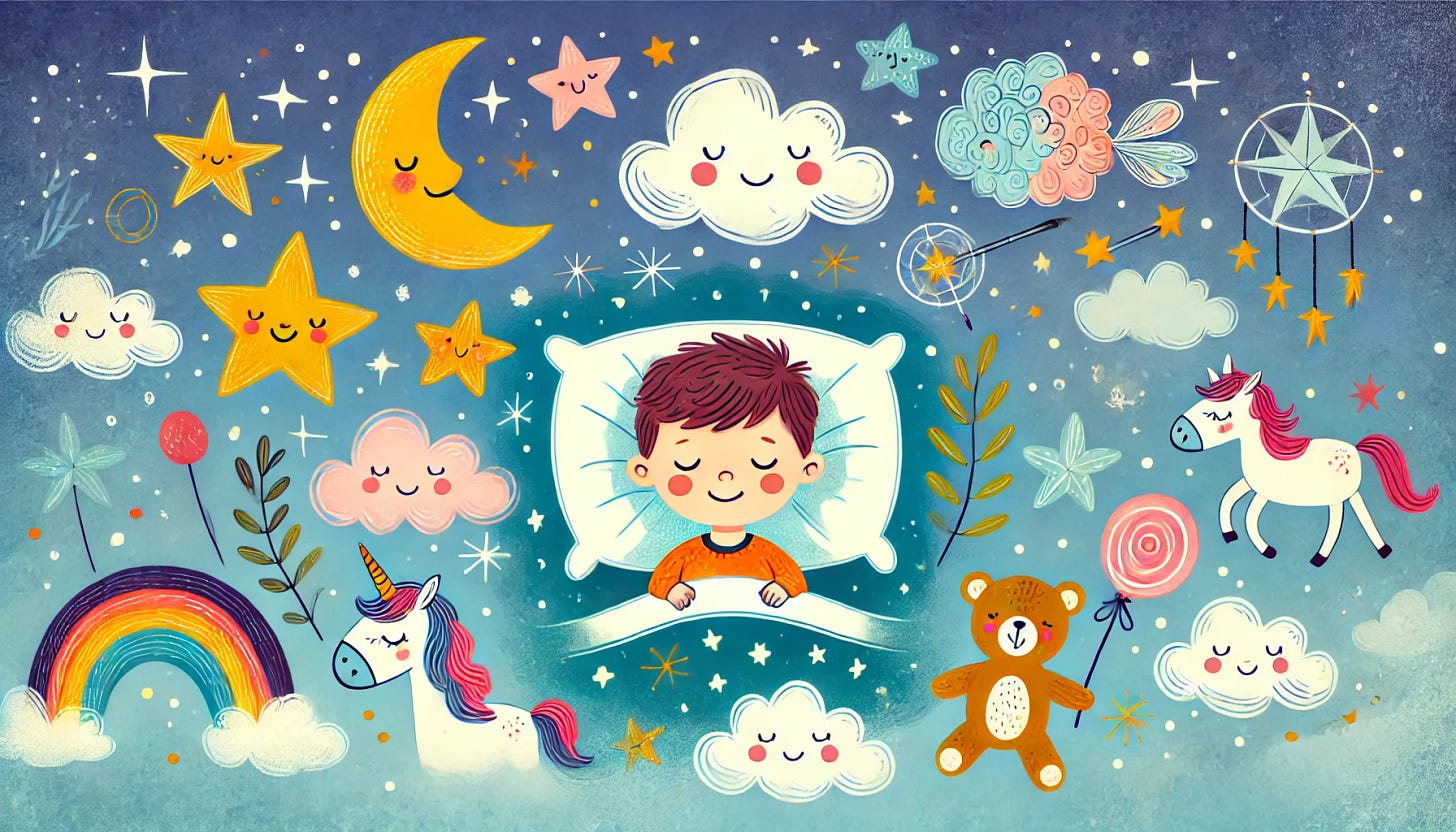Why Do We Dream When We Sleep?
Have you ever wondered, why do we dream when we sleep?
Dreaming is something almost all of us do while we sleep, but have you ever thought about why it happens or what dreams mean? In this article, we’re going to take a deep dive into the world of dreams. We’ll talk about what dreams are, why we dream, and the different types of dreams we might have. Plus, we’ll explore what scientists think about why we dream!
Let’s get started and discover the amazing world of dreams!
Hello my friends!
For a quick note, welcome to Tidbits with Titus, a podcast and newsletter where we tackle the big, curious questions kids ask every day in fun, bite-sized ways! I’m Alexander Titus, but I go by Titus. I’m a scientist, adventurer, and a huge fan of making science, technology, and life accessible to all ages. From “How does electricity work?” to “What are taxes?” and even “Why is the sky blue?” I’m here to dive into these wonder-filled questions with engaging stories and simple explanations that spark curiosity and make learning a joy. This effort is all about creating a space where families can learn together, discover the magic of the every day, and find thoughtful ways to explore the world’s big mysteries. Let’s make curiosity a family tradition—one tidbit at a time!
Just so you know, these podcast episodes are all AI-generated using Google’s really cool NotebookLM technology. That means there are some errors in how words are said, but that is part of the fun!
If your little ones have questions that you want help answering, shoot me an email at questions@tidbitswithtitus.com and I’ll see what I can do!
You can subscribe to the newsletter that has this information as well at tidbitswithtitus.com.
Also please share with anyone you think would be interested. The more the merrier!
Cheers,
-Titus
1. What Are Dreams?
Before we talk about why we dream, let’s first explore what a dream is. A dream is like a movie that plays in your mind while you’re asleep. Sometimes it feels like you’re doing something real, and other times, your dreams can be super strange, like talking to a talking cat or swimming in a pool of chocolate. Dreams can be funny, scary, exciting, or even confusing!
We usually dream during a special part of sleep called REM sleep, which stands for Rapid Eye Movement. During REM sleep, our brains are very active, even though our bodies are resting. This is the stage of sleep where most of our dreams happen.
Our brains are like super-powerful computers, and even though our bodies are resting, our brains never stop working. Instead of thinking about homework or what to have for lunch, our brains create stories, images, and ideas while we sleep—these are our dreams!
2. Why Do We Dream?
You might be wondering, Why do we dream? Well, scientists have been asking this question for a long time, and they have a few ideas about why we dream. Let’s explore some of the most popular theories.
1. Dreams Help Us Process Our Day
One of the most common ideas is that dreams help us process everything we did during the day. When we wake up, our brains are full of memories, thoughts, and emotions. Some scientists think that dreaming is a way for our brains to sort through all of this information. Imagine you have a big box of toys. Before bed, you might throw all your toys into the box without thinking about how to organize them. But while you sleep, your brain helps “clean up” that mess and puts everything in the right place. That’s kind of what dreams do—they help us organize our memories and emotions from the day.
For example, if something exciting or stressful happened during the day, like a big test or a fun playdate, you might dream about it while you sleep. This helps your brain sort through your feelings about that event.
2. Dreams Are Our Brain’s Way of Solving Problems
Another idea is that dreaming helps us solve problems. Have you ever gone to sleep feeling stuck on something—like a puzzle or a tricky question—and then woken up with an idea about how to solve it? Some people believe that while we sleep and dream, our brains are working hard to find answers to problems or think of new ideas. Sometimes, dreams show us solutions to problems we didn’t even realize we were thinking about!
For example, a person might dream about a math problem and see a new way to solve it. Or an artist might dream about a painting and wake up with fresh ideas for their artwork. This is one reason why dreams can feel so mysterious—because they sometimes offer creative or unexpected solutions!
3. Dreams Help Us Deal with Emotions
Have you ever had a bad day and then dreamed about something that helped you feel better? Some scientists think that dreams help us work through our emotions. If we’re feeling worried, sad, or even happy, our dreams may help us process those feelings.
For example, if you’re nervous about a test, you might dream about taking the test and feeling calm or confident. Or if something made you really happy, your dreams might show you having fun in exciting places with your friends. This helps your brain understand and balance those feelings so that you feel better when you wake up.
4. Dreams Help with Memory
Another reason we dream could be that dreams help us remember things. Our brains are always taking in information—whether it’s from school, our friends, or our surroundings. But we can’t remember everything! When we sleep, our brains go over the things we’ve learned or experienced during the day. This helps make sure that we remember the important stuff, and our dreams might be a way of “practicing” or “reviewing” memories. So, when we dream, we’re not just having fun stories play out in our minds. Our brain might be working to store important things in our memory, just like how you organize your toys in their right places!
3. The Stages of Sleep and Dreams
We know that dreams mostly happen during REM sleep, but what exactly happens when we sleep? Let’s explore the stages of sleep and how they relate to dreams!
Stage 1: Light Sleep
This is the first stage of sleep, and it’s when you first start to fall asleep. You might feel like you’re drifting in and out of sleep, and you might even feel like you’re falling or floating. This stage only lasts for a few minutes, but it’s the beginning of your sleep cycle.
Stage 2: Light Sleep
In stage 2, your body starts to relax more, and your brain waves slow down. You’re still not in deep sleep yet, but you’re on your way to it! It’s harder to wake up during this stage, but you’re not dreaming yet.
Stage 3: Deep Sleep
This is the stage when your body is resting the most. Your muscles relax, and your body is working to repair itself. This stage is very important because it helps you feel rested and energized in the morning.
Stage 4: REM Sleep
This is the stage where most of your dreams happen! During REM sleep, your brain becomes super active, and your eyes move quickly under your eyelids. Your body is actually paralyzed during this stage (don’t worry, it’s normal!), so you can’t act out your dreams. But even though your body is resting, your mind is busy dreaming!
It’s during REM sleep that we experience the most vivid, memorable dreams. This stage happens about 90 minutes after you fall asleep and repeats several times throughout the night.
4. Types of Dreams
Did you know there are different types of dreams? Here are some of the most common kinds of dreams people have:
1. Normal Dreams
Most of the dreams we have are just ordinary dreams that are kind of like stories. These dreams might not make a lot of sense, but they’re just your brain making up images and events while you sleep. You might dream about school, your friends, or a fun activity you did earlier in the day. These dreams can be silly, fun, or strange, and sometimes they don’t even have a clear beginning or end!
2. Lucid Dreams
Lucid dreaming is when you’re aware that you’re dreaming while it’s happening! It’s like knowing that the dream isn’t real, but you’re still in it. Some people can even control what happens in their lucid dreams—imagine flying around the world or going on an adventure while you sleep!
3. Nightmares
A nightmare is a scary dream that can make you feel afraid or upset. Nightmares are a normal part of sleep, especially if you’re going through a stressful time or feeling worried. While they can feel really scary, they are just your brain working through your emotions. If you have a nightmare, it’s okay to talk to someone about it, and remember that it’s just a dream!
4. Recurring Dreams
Some people have dreams that happen over and over again. These are called recurring dreams. If something big or emotional is happening in your life, you might dream about it again and again. It might be your brain’s way of trying to work through something important.
5. Daydreams
Daydreams are a bit different from regular dreams because they happen when you’re awake! Have you ever been in class and started thinking about something fun, like going to the beach or having an adventure? That’s daydreaming! Daydreams happen when your mind starts wandering, and you think about something that makes you feel happy, excited, or even worried.
5. Can We Control Our Dreams?
You might be wondering if we can control our dreams. The answer is yes—sometimes! Some people can learn how to have lucid dreams, where they know they are dreaming and can control what happens in the dream. For example, if you’re dreaming that you’re in space and you want to turn into a superhero, you might be able to make that happen in a lucid dream!
But lucid dreaming takes practice, and not everyone can do it. It’s something that people can try to learn over time. However, most of the time, our dreams just happen on their own, and we can’t control what’s going to happen next!
6. Fun Facts About Dreams
Here are a few fun facts about dreams:
We forget most of our dreams: Did you know that most of us forget about 90% of our dreams? If you wake up and remember a dream, it’s a special one! But most of our dreams fade away as the day goes on.
Animals dream too: Did you know that animals like dogs and cats can dream just like us? When your dog is sleeping and their paws are twitching, they might be dreaming about running or playing!
We dream in color: Most people dream in color, but some people only dream in black and white. Weird, right? Scientists aren’t sure why this happens, but it’s one of those funny things about dreams!
Dreams don’t always make sense: Sometimes, our dreams can be really weird. We might be in two places at once or talking to people we don’t know. That’s because our brains mix things up while we sleep!
7. Conclusion
Dreaming is a natural and mysterious part of sleeping. Whether your dreams are silly, scary, or exciting, they’re all a way for your brain to work through thoughts, feelings, and experiences. Although scientists are still learning about why we dream, we do know that dreams help us process our emotions, solve problems, and keep our memories organized.
So, the next time you have a dream, whether you’re flying, swimming with dolphins, or talking to a talking tree, remember that your brain is doing important work, even while you’re fast asleep!












